Related Research Articles

Partisan Review (PR) was a left-wing small-circulation quarterly "little magazine" dealing with literature, politics, and cultural commentary published in New York City. The magazine was launched in 1934 by the Communist Party USA–affiliated John Reed Club of New York City and was initially part of the Communist political orbit. Growing disaffection on the part of PR's primary editors began to make itself felt, and the magazine abruptly suspended publication in the fall of 1936. When the magazine reemerged late in 1937, it came with additional editors and new writers who advanced a political line deeply critical of Joseph Stalin's Soviet Union.
The Congress for Cultural Freedom (CCF) was an anti-communist cultural organization founded on 26 June 1950 in West Berlin. At its height, the CCF was active in thirty-five countries. In 1966 it was revealed that the Central Intelligence Agency was instrumental in the establishment and funding of the group. The congress aimed to enlist intellectuals and opinion makers in a war of ideas against communism.

Transition Magazine was established in 1961 by Rajat Neogy as Transition Magazine: An International Review. It was published from 1961 to 1976 in various countries on the African continent, and since 1991 in the United States. In recent years it has been published between twice and four times per year by Indiana University Press, since 2013 on behalf of the Hutchins Center for African and African American Research at Harvard University.
Encounter was a literary magazine founded in 1953 by poet Stephen Spender and journalist Irving Kristol. The magazine ceased publication in 1991. Published in the United Kingdom, it was an Anglo-American intellectual and cultural journal, originally associated with the anti-Stalinist left. The magazine received covert funding from the Central Intelligence Agency who, along with MI6, discussed the founding of an "Anglo-American left-of-centre publication" intended to counter the idea of Cold War neutralism. The magazine was rarely critical of American foreign policy and generally shaped its content to support the geopolitical interests of the United States government.
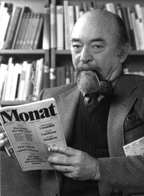
Melvin Jonah Lasky was an American journalist, intellectual, and member of the anti-Communist left. He founded the German journal Der Monat in 1948 and, from 1958 to 1991, edited Encounter, one of many journals revealed to have been secretly funded by the CIA through the Congress for Cultural Freedom (CCF).
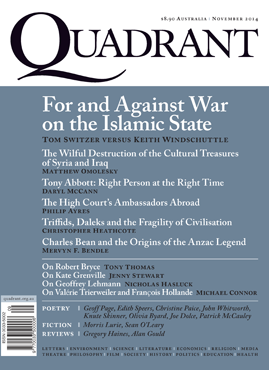
Quadrant is a conservative Australian literary, cultural, and political journal, which publishes both online and printed editions. As of 2019, Quadrant mainly publishes commentary, essays and opinion pieces on cultural, political and historical issues, although it also reviews literature and publishes poetry and fiction in the print edition. Its editorial line is self-described "bias towards cultural freedom, anti-totalitarianism and classical liberalism".
Mundo Nuevo was an influential Spanish-language periodical, being a monthly revista de cultura dedicated to new Latin American literature. Sponsored by the Ford Foundation, the magazine was founded by Emir Rodríguez Monegal in Paris, France, in 1966 and distributed worldwide. Monegal edited it until 1968 and resigned after a five-part installation in the New York Times that revealed the Congress for Cultural Freedom, a source of funding for the magazine, was a front for the CIA. In fact, it was started as a successor of another Spanish language magazine of the Congress, namely Cuadernos. Mundo Nuevo stopped in 1971 after 58 issues.
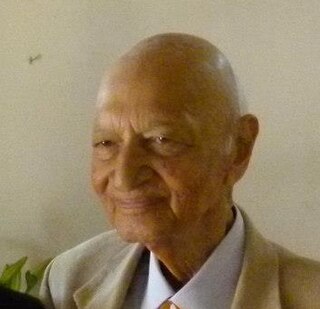
Zafar Rashid Futehally was an Indian naturalist and conservationist best known for his work as the secretary of the Bombay Natural History Society and for the Newsletter for Birdwatchers a periodical that helped birdwatchers around India to communicate their observations. Awarded Padma Shri by the Government of India in the year 1971, Zafar Futehally was also honoured with Dutch order of merit the Order of the Golden Ark in 1981 and Karnataka Rajyotsava award by the Government of Karnataka in 1983.
FORVM was an Austrian monthly cultural and political magazine, published in Vienna from 1954 to 1995, founded by Friedrich Hansen-Loeve, Felix Hubalek, Alexander Lernet-Holenia and Friedrich Torberg with the financial and logistical support of the CIA-funded Congress for Cultural Freedom (CCF). Torberg also edited the magazine from its start in 1954 to 1965. In 1965 Günther Nenning took over as editor and in 1986 Gerhard Oberschlick.
Quest was a quarterly and bimonthly Indian journal published between 1954 and 1975 and featuring 20 years of independent India’s publishing history.
Who Paid the Piper? The CIA and the Cultural Cold War is a 1999 book by Frances Stonor Saunders. The book discusses the mid-20th century Central Intelligence Agency efforts to infiltrate and co-opt artistic movements using funds that were mostly channelled through the Congress for Cultural Freedom and the Ford Foundation. The aim of these efforts was to combat the political influence of the Soviet Union and expand American political influence. Saunders concluded that by entangling the state in "free" artistic expression, the CIA undermined America's moral position in comparison to the Soviet Union. In Dissent Jeffrey C. Isaac wrote that the book is a "widely discussed retrospective on post-Second World War liberalism that raises important questions about the relationships between intellectuals and political power."

Black Orpheus was a Nigeria-based literary journal founded in 1957 by German expatriate editor and scholar Ulli Beier that has been described as "a powerful catalyst for artistic awakening throughout West Africa". Its name derived from a 1948 essay by Jean-Paul Sartre, "Orphée Noir", published as a preface to Anthologie de la nouvelle poésie nègre et malgache, edited by Léopold Sédar Senghor. Beier wrote in an editorial statement in the inaugural volume that "it is still possible for a Nigerian child to leave a secondary school with a thorough knowledge of English literature, but without even having heard of Léopold Sédar Senghor or Aimé Césaire", so Black Orpheus became a platform for Francophone as well as Anglophone writers.
Michael Josselson was a CIA agent.
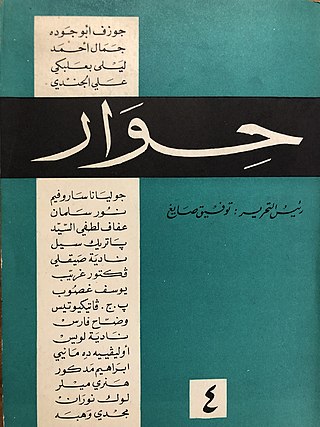
Hiwar was an Arabic magazine published in Beirut between 1962 and 1967. The magazine was established and financed by the CIA during the cultural Cold War, under the cover of a front organization, the Congress for Cultural Freedom.
Cuadernos was a Spanish-language magazine that was published in Paris, France, in the period 1953–1965. Its full title was Cuadernos del Congreso por la Libertad de la Cultura. It was one of the publications of the Congress for Cultural Freedom.
Tempo Presente was a monthly political magazine which existed between 1956 and 1967 in Rome, Italy. It was supported by the Congress for Cultural Freedom which published other magazines, including Cuadernos, Encounter, Survey and Der Monat.
Tilanne was a monthly leftist magazine published in Helsinki, Finland, in the period between 1961 and 1967. It was one of the magazines funded by the CIA through the Congress for Cultural Freedom (CCF) during the cultural Cold War.
Tawfiq Sayigh was a Palestinian academic, writer and journalist. He was the editor of the controversial Hiwar magazine.
Il Ponte is a political and literary magazine in Milan, Italy, which has been in circulation since April 1945.
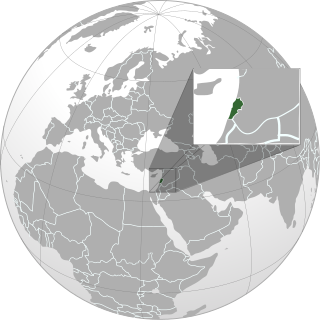
CIA activities in Lebanon refers to confirmed and alleged activities carried out in Lebanon by the Central Intelligence Agency (CIA).
References
- 1 2 3 4 5 Frances Stonor Saunders (2001). The Cultural Cold War: The CIA and the World of Arts and Letters. New York: The New Press. pp. 61, 130, 133. doi:10.1163/2468-1733_shafr_sim140150101. ISBN 978-1565846647.
- ↑ Edward Shils; Peter Coleman (2009). "Remembering the Congress of Cultural Freedom". Society. 46 (5): 442. doi:10.1007/s12115-009-9243-4. S2CID 142993096.
- ↑ Trevor Barnes (1982). "The Secret Cold War: The C.I.A. and American Foreign Policy in Europe 1946-1956. Part II". The Historical Journal . 25 ssue=3: 667. JSTOR 2638749.
- ↑ Jason Hardling (2017). "'Our greatest asset': Encounter Magazine and the Congress for Cultural Freedom". In Giles Scott-Smith; Charlotte A. Lerg (eds.). Campaigning Culture and the Global Cold War. London: Palgrave Macmillan. pp. 107–125. doi:10.1057/978-1-137-59867-7_6. ISBN 978-1-137-59866-0.
- 1 2 3 4 5 6 7 8 9 10 Nicolas Stenger (2017). "The Difficult Emergence of an 'Anti-Totalitarian' Journal in Post-War France: Preuves and the Congress for Cultural Freedom". In Giles Scott-Smith; Charlotte A. Lerg (eds.). Campaigning Culture and the Global Cold War. London: Palgrave Macmillan. pp. 91–106. doi:10.1057/978-1-137-59867-7_5. ISBN 978-1-137-59866-0.
- ↑ Neil Berry (Spring 1993). "Encounter". The Antioch Review . 51 (2): 196. doi:10.2307/4612707. JSTOR 4612707.
- 1 2 Andrea Scionti (Winter 2020). ""I Am Afraid Americans Cannot Understand": The Congress for Cultural Freedom in France and Italy, 1950–1957". Journal of Cold War Studies . 22 (1): 92. doi:10.1162/jcws_a_00927. S2CID 211147094.
- ↑ Andrew N. Rubin (2012). Archives of Authority: Empire, Culture, and the Cold War. Princeton, NJ: Princeton University Press. p. 19. ISBN 978-0-691-15415-2.
- 1 2 Elizabeth M. Holt (2013). ""Bread or Freedom": The Congress for Cultural Freedom, the CIA, and the Arabic Literary Journal Ḥiwār (1962-67)". Journal of Arabic Literature. 44 (1): 83, 90. doi:10.1163/1570064x-12341257.